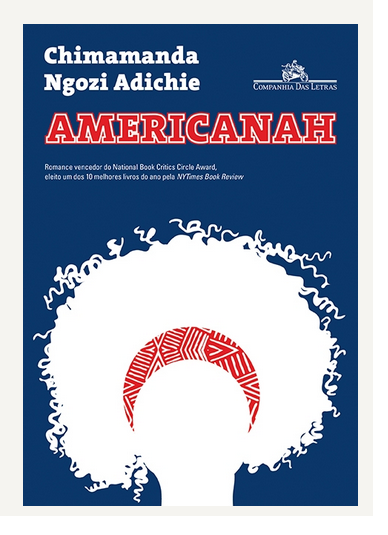Book Review: ‘Americanah’ by Chimamanda Ngozi Adichie

Americanah by Chimamanda Ngozi Adichie is CAS’ required summer reading, telling the story of a young Nigerian woman pursuing her education in the US.
August 28, 2017
I did something unthinkable this summer — I read the Class of 2021’s required reading, “Americanah” by Chimamanda Ngozi Adichie, for pleasure. And I would recommend for everyone else to do the same.
Each year the College of Arts and Science assigns a book to incoming freshmen as a part of the First-Year Dialogue Program. Usually my pulse quickens at the thought of mandatory reading, but the books selected seem focused on enriching social views and opening discussions on diversity, race, and identity that can often be easier to avoid than to confront. Last year, I was pleasantly surprised by the university’s selection of “Between the World and Me” by Ta-Nahisi Coates. This year, I once again found myself floored by NYU’s choice of the eye-opening work of Adichie with her beautifully written, achy and tender novel, for which she won the 2013 National Book Critics Circle Fiction award.
Americanah illustrates the ebbs and flows of life for Ifemelu, a Nigerian woman who moved to the United States for college after a series of strikes at her university in Nigeria. Readers watch carefully as she adjusts to life in America and afterwards as she struggles with finding her identity among the many chaotic voices around her.
Throughout the novel, the reader notices frequent and ongoing instances of both intentional and unintentional racism directed toward Ifemelu. We watch helplessly as she and other people of color are discriminated against in the workplace, in the dating field, at university and generally in day-to-day life — sometimes by well-meaning, but ultimately ego-centric, Americans, sometimes by those who are simply ignorant and hateful and sometimes even by other people of color.
What hurts the most about this book is that although it is fiction, it is real.
It’s impossible to truly understand what someone else’s life is like, but Adichie paints an extremely thorough outline. One particular scene where Ifemelu is taking the train to an inconveniently distant area of New Jersey to get her hair braided stuck with me in that it demonstrates the genius of Adichie’s subtle tone and peppered anecdotes. Ifemelu is annoyed by the distance that she has to travel to find a salon where she can get braids but ultimately comes to the conclusion that it would be unreasonable to expect such a place nearby with so few black locals in Princeton. A few moments later, she notices a man at the train station eating ice cream:
“The man standing closest to her was eating an ice cream cone; she had always found it a little irresponsible, the eating of ice cream cones by grown-up American men, especially the eating of ice cream cones by grown-up American men in public.”
The contrast between the life of Ifemelu and that of this man is just one piece of the puzzle that Adichie nudges toward her readers in “Americanah” — the puzzle composed of race, privilege and the destructive fist of American identity, a puzzle which explains how this country is wired to build some people up and knock others down. She is not asking for pity, she is spelling out the truth.
However, Adichie is careful not to make this the central plot of the novel. Although the world around Ifemelu does not aid in her original transition from Nigeria to the United States, the story is about her personal identity, the universal search for love and the reality of life in America for immigrants. Having moved to this country only recently myself, I couldn’t help but choke back emotions when Ifemelu describes her first few days in Manhattan, seeing my own reflection in her thoughts.
It saddens me to think of all the slick freshmen who decided to bypass this reading and blunder their way through the group discussions. It saddens me to think that the puzzle will remain deconstructed before their eyes.
A version of this article appeared in the Sunday, Aug. 27 print edition. Email Jemima McEvoy at [email protected].

























































































































































Taylor McKeown • Oct 12, 2017 at 10:05 pm
Every day, news media coverage and social media posts are flooded with talk about Black Lives Matter. Phrases such as “institutional racism” and “white privilege” dominate the headlines, but are these claims made by the BLM movement legitimate? Chimamanda Ngozi Adichie explores what it means to be black in America in her novel Americanah. Centered around the story of Ifemelu, a Nigerian who comes to the United States for college, she grapples with what it means to be “black” for the first time in her life. Adichie’s work provides a significant and invaluable perspective for supporters of the Black Lives Matter movement as it demonstrates towards a white audience what exactly blacks in America face on a daily basis. Adichie utilizes the Non-American perspective of the main character, blog post entries, and juxtaposition between Nigerian and American life to effectively illustrate the black experience and the challenges they face in America that a white audience might not be aware of.
Because Ifemelu is Nigerian and not from the United States, her point of view on American culture and society provides a fresh, non-American perspective that aids the audience in understanding what aspects of American culture are problematic. When you are born and raised in a single culture it is often difficult to discern what aspects of it are not universal norms that you might believe are widely acceptable. Because many white Americans are born into the “American tribalism hierarchy of race” as Adichie calls it, many fail to see that the treatment of minorities, specifically black Americans, is drenched in prejudice and discrimination. Ifemelu’s experience in America as someone from a foreign land provides white Americans with a hidden insight into their own culture, such as how the phrase “I know” here in America “profess[es] agreement rather than knowledge”(p 4). Furthermore, she juxtaposes her Nigerian life with her American experience to show the cultural differences in treatment of race in the two countries. In Nigeria, where everyone was black, no one was “black”, they were just human. However, upon coming to America, Ifemelu becomes aware of her blackness and how she is thus treated differently than others. By showing the white audience this difference, Adichie enables them to see the validity in the argument that racial discrimination and prejudice still do permeate American culture, even if it’s not as apparent as in the 1960s.
Adichie illustrates much of Ifemelu’s experience in America through her daily routine interactions. Throughout much of the book, you follow her through bus trips, hair appointments, and at shopping centers and see the way different races, both white and black, treat her. These examples of daily actions show that the issue of racism is prevalent throughout the daily lives of black Americans and that it’s not just big outrageous acts of discrimination. The embedded prejudice of many white Americans becomes apparent in passing comments, looks and side interactions every day, and racism no longer just appears in the form of blazing crosses and segregated bathrooms. Because Adichie illustrates the racism Ifemelu suffers in small interactions, it enables the white audience to look past their own personal experiences and see that just because they don’t see blatant racism, doesn’t mean black Americans don’t face it subtly every day. By looking at these common daily interactions, a white reader can easily compare their own experience with Ifemelu’s and realize the stark contrast in how they themselves are treated compared to her. Through this, the white audience can see that their own experiences are not universal for everyone, and that blacks in America do indeed still face discrimination.
Adichie includes Ifemelu’s blog posts that provide a realistic insight into the black experience. The succinct and blunt nature of the posts often shocks the reader, as there’s no fluff and no room to spare feelings in them. Detailing American Tribalism, in America, tribalism is alive and well…there’s a ladder of racial hierarchy…white is always on top…American black is always on the bottom”(p. 227), Adichie exposes rather bluntly who gets preferential treatment in the United States. From a white audience member’s perspective, this news is often rejected as many believe that racism is no longer an issue in our society since segregation was legally abolished. However, this short and concise expression of the racial ladder in America along with her justification for her claims effectively tears down the “racism no longer exists” argument and forces the audience member to see that blacks are still discriminated against. Adichie also includes the excerpt, “Most of all, don’t be angry about racism. Otherwise you get no sympathy…the conservative will tell you that YOU are the real racist and your mouth will hang open in confusion” (p. 275) that shows that blacks have to act a certain way to please whites, otherwise they will be portrayed or thought of in a negative light. This “instruction guide” for blacks on how to talk about racism is effective when trying to reach a white audience member because it enables them to consider their own role and reactions to the conversation of racism. By realizing that these statements apply to their own life, they are able to see the role their white privilege plays in the discussion of racism.
Whether we want to accept it or not, racism is still deeply embedded in our country. Although it may no longer appear in the form of Jim Crow laws or lynching, the daily life of a black American is still filled with prejudiced interactions with white Americans. Adichie’s Americanah utilizes the story of Ifemelu, a story told in fiction that is rooted in the common experiences of black Americans, to expose the discriminatory treatment that still exists to a white audience that all too often refuses to see the truth. Through this novel, the Black Lives Matter movement has an opportunity to reach white audience members and the resource to show them the reality of black lives here in America.